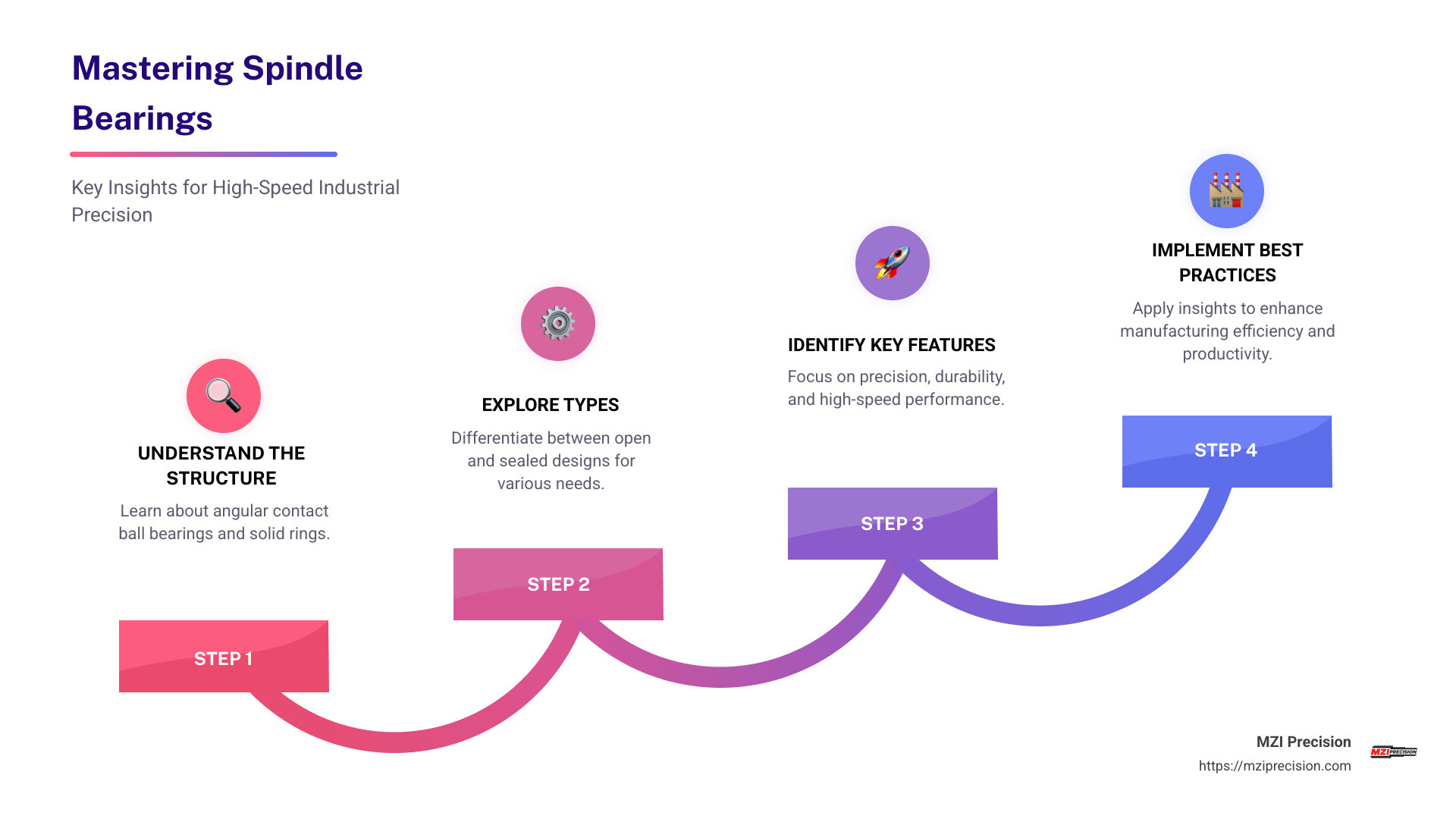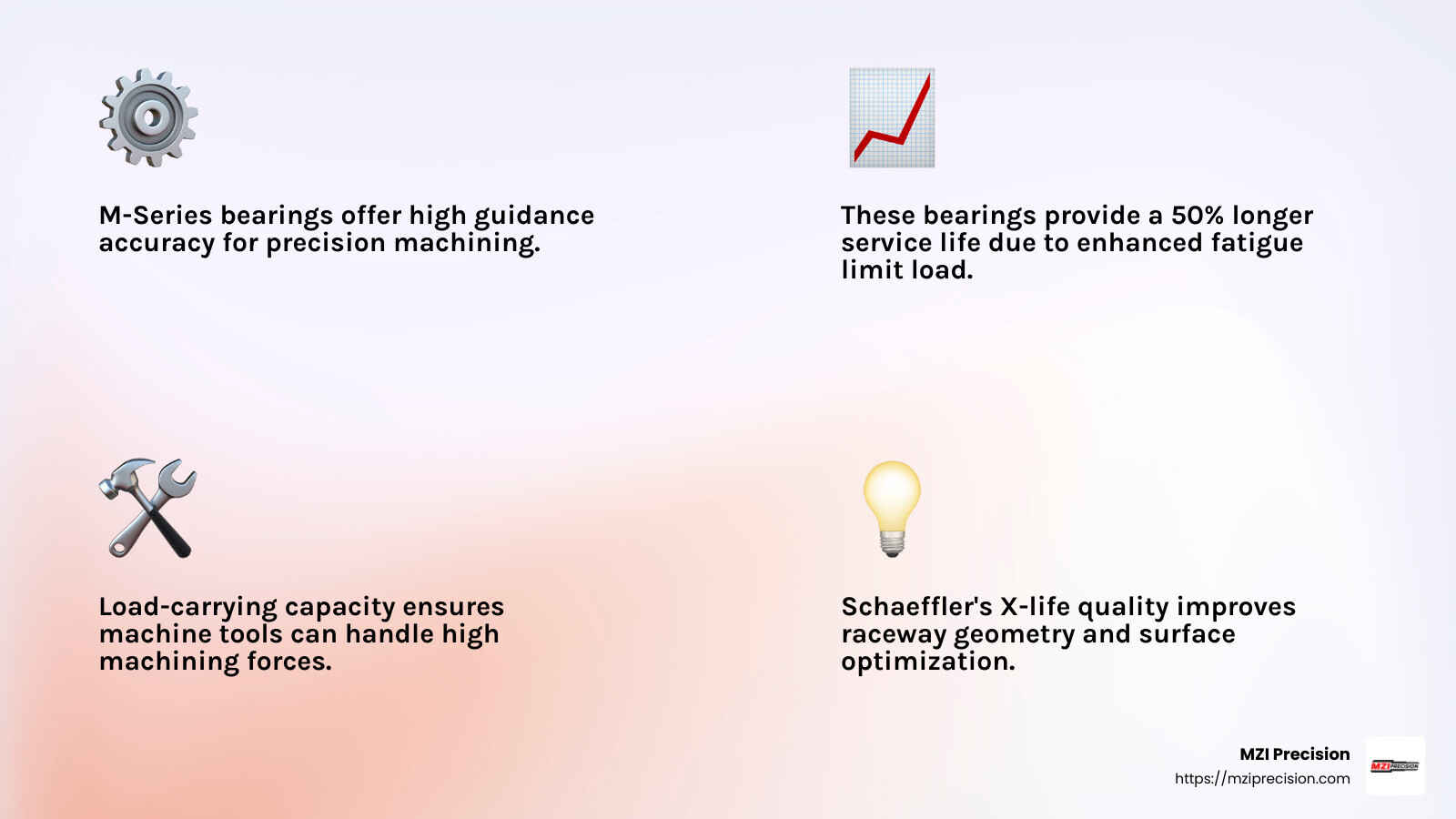Mastering Spindle Bearings: Precision Insights
Spindle bearings are critical components in industrial manufacturing, enabling machines to operate with high precision and speed. These bearings are pivotal in ensuring that machine tool spindles perform optimally, providing the necessary support for high-speed operations and maintaining accuracy even under demanding conditions. For manufacturing industries, especially those in sectors like aerospace, the reliability and performance of spindle bearings directly impact productivity and efficiency.
Key Insights on Spindle Bearings:
- Improved Performance: Spindle bearings are engineered for exceptional precision and stability, even during high-speed operations.
- Durability: Designed to withstand significant stress and demanding environments, ensuring long-lasting performance.
Understanding spindle bearings can transform manufacturing capabilities, granting improved productivity and efficiency. As industrial machinery continues to advance, so does the demand for robust and precise spindle solutions. This guide will explore the intricacies and benefits of spindle bearings to support your manufacturing needs.

Common spindle bearings vocab:
– High-speed spindle balancing
– bearing spindle assembly
– lathe spindle assembly
Understanding Spindle Bearings
Types of Spindle Bearings
Spindle bearings are essential for the high-speed and precision operations of machine tools. These bearings come in various types, each custom to meet specific operational needs.
Angular Contact Ball Bearings
One of the most common types is the angular contact ball bearing. These bearings are designed to handle both radial and axial loads, making them perfect for high-speed applications. The unique feature of angular contact ball bearings is their contact angle, which allows them to manage loads more effectively. This is especially important in applications where precision is critical, such as in industrial manufacturing spindles.
Solid Inner and Outer Rings
Spindle bearings typically have solid inner and outer rings. This design improves their strength and durability, allowing them to withstand the high speeds and stresses encountered in industrial environments. The solid rings provide a stable structure that supports the bearing’s overall performance.
Open and Sealed Designs
Spindle bearings are available in both open and sealed designs. Open bearings are ideal for applications where maintenance and lubrication are easily accessible. On the other hand, sealed bearings are designed to protect the internal components from contaminants, reducing the need for frequent maintenance. Sealed designs are often preferred in environments where dust and debris are prevalent.
Restricted Tolerances
Precision is key in spindle bearings, and this is achieved through restricted tolerances. These bearings are manufactured to very tight specifications, ensuring that they provide the necessary guidance accuracy for high-speed operations. The restricted tolerances also contribute to the longevity and reliability of the bearings, making them a vital component in precision machining.
In summary, the choice of spindle bearing type depends on the specific requirements of the application. Whether it’s the ability to handle high speeds, manage loads effectively, or operate in challenging environments, understanding the different types of spindle bearings is crucial for optimizing machine tool performance.
This understanding of spindle bearings sets the foundation for exploring their role in high-speed industrial manufacturing. In the next section, we will dig into how these bearings contribute to machine tool efficiency and productivity.
High-Speed Spindle Bearings in Industrial Manufacturing
In industrial manufacturing, spindle bearings play a crucial role in enhancing the performance of machine tools. These bearings are essential for achieving the precision and speed needed in modern manufacturing processes.
High-Speed Spindle Bearings
High-speed spindle bearings are a game-changer in the industry. These bearings are designed to meet the demanding needs of machine tools, offering exceptional guidance accuracy and load-carrying capacity.
Machine Tools and Guidance Accuracy
Machine tools rely heavily on the precision of spindle bearings. High-speed bearings are engineered to provide the highest level of guidance accuracy, which is vital for producing high-quality components. This precision ensures that the tools operate smoothly and efficiently, reducing errors and improving overall productivity.
Load Carrying Capacity
Another standout feature of high-speed spindle bearings is their impressive load-carrying capacity. These bearings can handle the high machining forces encountered in industrial environments, allowing machine tools to perform at their best even under heavy loads. This capability is essential for maintaining the durability and reliability of the equipment.
Quality and Longevity
Commitment to quality is evident in high-speed spindle bearings. These bearings feature improved raceway geometry and optimized surfaces, leading to a significant increase in their fatigue limit load. This improvement results in up to 50% longer service life compared to standard bearings, making them a cost-effective choice for manufacturers.

Boosting Productivity
The advancements in spindle bearing technology directly translate to increased productivity in industrial manufacturing. By ensuring that machine tools operate with precision and reliability, these bearings help manufacturers meet the high demands of modern production lines.
In the next section, we will explore common issues and maintenance practices for spindle bearings, ensuring they continue to perform at their peak.
Common Issues and Maintenance of Spindle Bearings
Spindle bearings are vital for the smooth operation of machine tools, but they are not without their challenges. Regular maintenance is key to keeping them in top shape and avoiding costly downtime.
Symptoms of a Bad Spindle Bearing
Recognizing the signs of a failing spindle bearing early can save a lot of time and money. Here are some common symptoms to watch out for:
- Noise: A spindle bearing in trouble often makes unusual noises. Grinding, screeching, or rumbling sounds can indicate internal problems, such as worn or damaged components.
- Contamination: Dust, metal shavings, and other debris can contaminate the bearings, leading to increased friction and wear. This contamination can cause the bearing to degrade faster, affecting performance.
- Lubricant Issues: Proper lubrication is essential for reducing friction and heat in spindle bearings. Over time, lubricants can become contaminated or break down, leading to increased wear and tear.
- Scarring and Gouges: Physical damage like scarring or gouges on the bearing surfaces can result from improper handling or contamination. These imperfections disrupt the smooth rotation of the spindle, leading to decreased precision.
- Discoloration: Overheating or lack of lubrication can cause discoloration on the bearing surfaces. This is a clear sign that the bearing is operating under stress and may soon fail.
Regular inspections and maintenance can help identify these issues early. By addressing them promptly, you can extend the life of your spindle bearings and maintain the efficiency of your machine tools.
In the following section, we’ll dig into frequently asked questions about spindle bearings, providing valuable insights into their function and maintenance.
Frequently Asked Questions about Spindle Bearings
What are spindle bearings?
Spindle bearings are specialized components designed to support the rotating axis of machine tools. They are typically single-row angular contact ball bearings with solid window cages, which help them handle both radial and axial loads effectively. These bearings are crucial for achieving high precision and speed in industrial manufacturing applications. Their design ensures that machine tools can operate smoothly, even under demanding conditions.
What are the symptoms of a bad spindle bearing?
A failing spindle bearing can cause several noticeable issues:
- Uneven Tire Wear: If you notice uneven wear on machine components, it might be due to spindle bearing problems. This uneven wear can lead to decreased efficiency and increased maintenance costs.
- Ride Quality Problems: In industrial settings, poor spindle bearing performance can affect the overall quality of machine operation, similar to how a vehicle might ride poorly with bad bearings. This can result in vibrations or instability during high-speed operations.
What is the problem with spindle bearings?
Spindle bearings can face several challenges:
- Contaminated Lubricant: Over time, lubricants can become contaminated with dirt, metal particles, or other debris. This contamination increases friction and wear, leading to premature failure of the bearings.
- Unclean Coolant: Coolants used in machine tools can also become contaminated, affecting the lubrication and cooling of spindle bearings. This can lead to overheating and potential damage.
Regular maintenance and careful handling can mitigate these problems, ensuring that spindle bearings continue to perform optimally in industrial applications.
Conclusion
At MZI Precision, we understand that spindle bearings are the heart of any machine tool. Ensuring their optimal performance is crucial for maintaining precision and efficiency in industrial manufacturing. Our expertise lies in spindle repair and rebuilding, where we focus on restoring your equipment to its peak condition.
We pride ourselves on delivering exceptional service. Our team performs rigorous quality control checks and conducts thorough performance testing to guarantee that each spindle not only functions but excels. We know that downtime can be costly, so we prioritize swift, efficient restoration services without compromising quality.
By choosing MZI Precision, you’re not just opting for a repair service; you’re partnering with a company committed to enhancing the performance and reliability of your machinery. Whether you require a precision spindle bearing or a complete spindle rebuild, our team is ready to support you in achieving optimal machine performance.
Find how our services can benefit your operations by visiting our Spindle Bearing Assembly service page. Let us help you keep your machinery running at its best, ensuring top-notch productivity and quality in your manufacturing processes.



